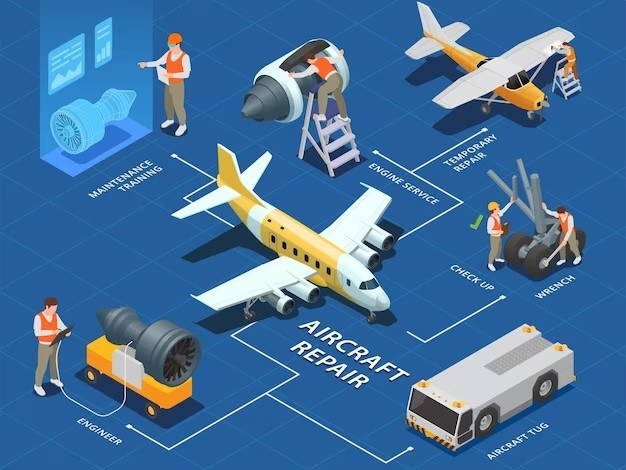The Importance of Safety in Aircraft Component Storage and Handling

The aviation industry operates under stringent safety protocols, with every component playing a crucial role in ensuring the overall safety of aircraft. Proper storage and handling of aircraft components are critical to maintaining their integrity and functionality. Mishandling or improper storage can lead to deterioration, malfunction, and potential safety hazards. The importance of safety in these processes cannot be overstated, as it directly impacts the reliability of aircraft operations. This article delves into the key aspects of safe storage and handling practices for aircraft components, highlighting their significance in aviation safety.
Ensuring Component Integrity
One of the primary reasons for stringent storage and handling protocols is to ensure the integrity of aircraft components. Each part, whether large or small, has a specific role and must perform flawlessly. Environmental factors such as temperature, humidity, and exposure to contaminants can adversely affect components if not stored correctly. Proper storage conditions prevent corrosion, degradation, and other forms of damage, thereby extending the lifespan of the parts. Consistent monitoring and maintaining optimal storage conditions are essential to preserving the quality and reliability of aircraft components.
Preventing Contamination and Damage
Contamination and physical damage are significant concerns in the storage and handling of aircraft components. Contaminants such as dust, moisture, and chemical residues can compromise the functionality of sensitive parts. Physical damage during handling, such as scratches, dents, or fractures, can render a component unsafe for use. Implementing strict handling procedures and using appropriate protective materials minimizes the risk of contamination and damage. Regular inspections and adherence to handling guidelines are crucial to safeguarding these components from any adverse effects.
Proper Labeling and Documentation
Accurate labeling and documentation are vital in the storage and handling of aircraft components. Proper labeling ensures that each component can be easily identified, tracked, and retrieved when needed. Documentation provides a detailed history of the component, including its origin, maintenance records, and any previous issues. This information is essential for maintaining an efficient inventory system and ensuring that only certified and safe components are used. Mislabeling or lack of documentation can lead to the use of incorrect or unapproved parts, posing significant safety risks.
Training and Competence of Personnel
The safety of aircraft component storage and handling also hinges on the competence and training of the personnel involved. Workers must be well-trained in handling procedures, storage requirements, and safety protocols. Regular training sessions and updates on new safety guidelines help maintain a high standard of practice. Competent personnel can identify potential hazards and take corrective actions promptly, preventing mishaps. Investing in comprehensive training programs ensures that everyone involved is equipped with the knowledge and skills necessary to handle aircraft components safely.
Use of Advanced Storage Solutions
Advanced storage solutions, such as climate-controlled environments and automated storage systems, play a significant role in enhancing the safety of aircraft component storage. Climate control ensures that temperature and humidity levels remain within the specified range, protecting components from environmental damage. Automated systems reduce human error and enhance efficiency in retrieving and storing parts. These technologies not only safeguard the components but also improve the overall efficiency of the storage process. Incorporating advanced storage solutions is a proactive approach to mitigating risks and ensuring the longevity of aircraft parts.
Regular Audits and Compliance
Regular audits and compliance checks are essential to maintaining the safety standards of aircraft component storage and handling. Audits help identify areas of improvement, ensuring that all practices align with industry regulations and safety guidelines. Compliance with aviation standards, such as those set by the Federal Aviation Administration (FAA) and other regulatory bodies, is mandatory. Non-compliance can result in severe penalties and compromise the safety of aircraft operations.
Importance of Packaging
Proper packaging is crucial in protecting aircraft components during storage and transportation. Packaging materials should provide adequate cushioning and protection from environmental factors. Specialized packaging solutions, such as anti-static bags and corrosion-inhibiting wraps, are often necessary for sensitive components.
Implementation of Safety Protocols
Implementing and adhering to safety protocols is fundamental to ensuring the safe storage and handling of aircraft components. Safety protocols should cover every aspect, from receiving and inspecting parts to storing and eventually deploying them. Clear guidelines and standard operating procedures (SOPs) help streamline processes and reduce the risk of errors. Regular reviews and updates of these protocols ensure they remain relevant and effective. Strict implementation of safety protocols is a key element in maintaining the reliability and safety of aircraft operations.
Conclusion
The importance of safety in the storage and handling of aircraft components is paramount in ensuring the overall safety and reliability of aviation operations. Ensuring component integrity, preventing contamination and damage, proper labeling and documentation, and the competence of personnel are all critical factors.







